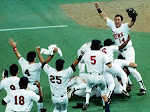
I was listening to AM 1500's broadcast of Twinsfest on Saturday and was struck by an interview that took place with Twins leftfielder Delmon Young. When the topic of if Young would miss the Metrodome was asked he was very clear that he never could see the ball against the roof and especially during day games. Young didn't just say one sentence, but was empathic in his dislike for the roof and how it caused him problems seeing the ball. Could moving outdoors transform Delmon Young from a very poor leftfielder to just a poor leftfielder? Was the Metrodome roof Delmon Young's kryptonite? All kidding aside the days of seeing him as an unwatchable force with a glove may be over. Look at these statistics regarding Delmon Young's fielding.
- In 2006 Young played 30 games/252 innings in right field. This is a small sample size, but his UZR/150 was 17.9. This is the runs above average he was rated per 150 games played. Delmon is seen as an above average outfielder in his first season.
- In 2007 Young played 133 games/1,134 innings in right field. With an appropriate sample size his defensive issues were shown, but only to a tune of 3.0 for his UZR/150. Delmon is rated a slightly above average outfielder here. Young also played 29 games/242.2 innings in centerfield. He must have been a disaster because he had a (shield the children's eyes)UZR/150 of -44.7! I'm assuming he was moved to right field after this and then traded to the Twins in the offseason.
- In 2008 the Twins moved Young to left field under the teflon sky of the Metrodome. He played 151 games/1,324 innings there. His UZR/150 plummeted to -14.9. Delmon can no longer be considered an average fielder, he's letting an additional 15 runs to score a year.
- In 2009 Young continues to play left field where he logs 98 games/806.2 innings. A severe cut in playing time, but the UZR/150 continues to go the wrong direction stopping at an eye averting -25.6! Unbelievably he let 25 runs score that shouldn't have.
It may be hard to conceive, but young Delmon has gone from a +3 runs above average outfielder to a -25.6 runs below average statue. Is it possible he can take baby steps and become a UZR/150 -10.0 outfielder by just moving outside to Target Field? I think he can, but if he can't it may be time to put his glove wherever the White Sox put Frank Thomas' glove years ago.













